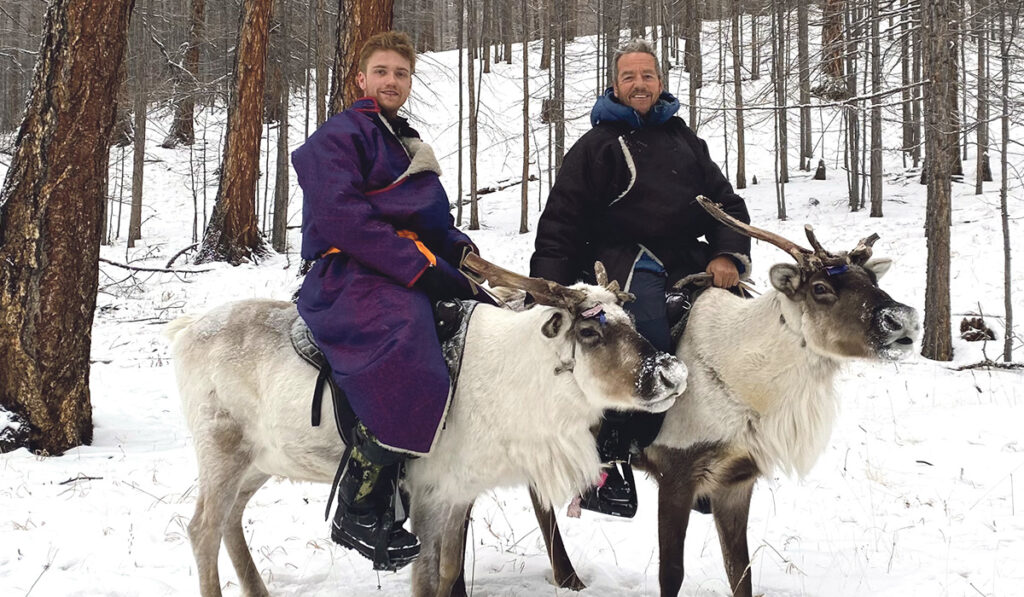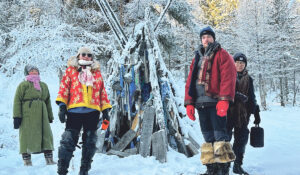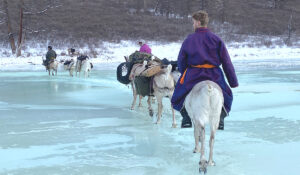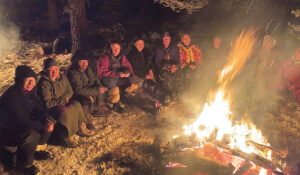
A great adventurer at heart, Andrew Bayly, MP for Port Waikato recently took on an incredible journey to Mongolia with his youngest son, George. In 2016, Bayly created lifelong memories with his oldest son James whilst embarking on an epic trek to the North Pole. Two years later, Bayly followed the footsteps of Lawrence of Arabia, as he trekked on camel for 22 days through the deserts of Jordan with his second son, Daniel. 21-year-old GEORGE BAYLY writes about the biggest adventure of his life as they traversed the remote and stark landscapes of Mongolia.
The Dukha live in the Khövsgöl region of northern Mongolia and are one of the last groups of nomadic reindeer herders in the world. Given the harsh realities of their life, the tradition is likely to die out over the next couple of decades. Our trip would offer the prospect of witnessing this before it disappears.
We wanted to visit in winter and spend a lengthy period with the Dukha – something that had not been done before by Westerners. We took a New Zealand film producer and Mongolian cameraman with us so we can make a documentary to help raise awareness of them.
The Dukha are people of incredible determination, able to survive in a brutal environment. They are some of the most generous and kind-hearted people we have ever encountered. But their future is bleak
January is the coldest time of the year in Mongolia, with daytime temperatures as low as minus 43° C. Our accommodation would be very basic: the Dukha live in tepees made from canvas thrown over birch logs, with a bare earthen floor.
We would be facing days of travel in deep snow while riding reindeer, so we bought specialised clothing and sleeping bags rated to minus 35 degrees. Once in Mongolia though, we also wore the local gear of pants made from yak wool, knee-high dog-fur lined boots, sheepskin-lined coats, and a mink hat. We also bought two mega-strong head torches to go out at night on wolf patrol.
After five days’ travel via 4WD vehicles, we finally met our Dukha family and were welcomed with a meal of precious reindeer meat. The Dukha rarely kill a reindeer for meat. Reindeer are primarily raised for their milk which has a very high fat content and can be left for months in a plastic container without needing to be chilled. For a Mongolian, the best meal ever is boiled meat – usually goat or sheep – with noodles, and this is served as a soup for breakfast, lunch and dinner. Not very palatable!
For a Mongolian, the best meal ever is boiled meat – usually goat or sheep – with noodles, and this is served as a soup for breakfast, lunch and dinner. Not very palatable!
It took a day to ride to their main encampment at 1800m elevation. Here we got to experience the difficulty with which the Dukha carry out even menial tasks – like collecting and chopping firewood or using a hatchet to break through the frozen river to access fresh water. One of the daily tasks was rounding up any reindeer that had escaped overnight and herding them back into the enclosure.
Every day we would ride a reindeer for around 20-30 km, either to visit people, check out an area as potential grazing, or see a particular sight. Reindeers have an amazing ability to travel through snow. They have oversized, crescent-shaped hooves which enables them to walk on snow without sinking into it. If you watch a herd of reindeer, they will all step in the tracks made by the leading reindeer.
We enjoyed some memorable trips. On one occasion we stayed at a separate camp for two evenings so we could see more of the Forbidden Land. On another night, we got caught out in the dark and had to sleep out in the snow without any shelter. When we woke up, we were all covered in snow.
Our hardest trip was to the tallest peaks nearby to see over the border to Russia and to hunt wild boar. We had to ride up a near 35-degree slope, and this was when our reindeer demonstrated just how powerful they are, climbing a steep slope in waist-deep snow with an adult rider and their packs on their back.
The Dukha are people of incredible determination, able to survive in a brutal environment. They are some of the most generous and kind-hearted people we have ever encountered.
But their future is bleak. The only realistic prospect is tourism. It is dreadful to think this small but dynamic group may need to remain stationary so that international tourists can come and ‘witness’ them during the summer months.
I am so happy that we managed to spend time with them in their natural environment. I have many wonderful memories, but my most treasured one will be the time I shared with my dad, away from all the distractions of our everyday lives.



